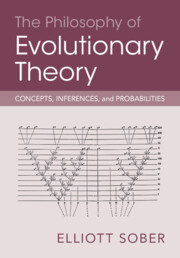Book contents
- The Philosophy of Evolutionary Theory
- The Philosophy of Evolutionary Theory
- Copyright page
- Dedication
- Contents
- Figures
- Tables
- Preface
- Acknowledgments
- 1 A Darwinian Introduction
- 2 Fitness and Natural Selection
- 3 Units of Selection
- 4 Common Ancestry
- 5 Drift
- 6 Mutation
- 7 Taxa and Genealogy
- 8 Adaptationism
- 9 Big-Picture Questions
- References
- Index
3 - Units of Selection
Published online by Cambridge University Press: 01 February 2024
- The Philosophy of Evolutionary Theory
- The Philosophy of Evolutionary Theory
- Copyright page
- Dedication
- Contents
- Figures
- Tables
- Preface
- Acknowledgments
- 1 A Darwinian Introduction
- 2 Fitness and Natural Selection
- 3 Units of Selection
- 4 Common Ancestry
- 5 Drift
- 6 Mutation
- 7 Taxa and Genealogy
- 8 Adaptationism
- 9 Big-Picture Questions
- References
- Index
Summary
● Darwin invented the concept of group selection to explain the evolution of traits that lead individuals to improve the fitnesses of others at a fitness cost to self. Such traits are now called “altruistic.” ● Understanding Simpson’s paradox is key to understanding how natural selection can cause altruism to increase in frequency in a meta-population. ● A criterion is derived for when altruism is fitter than selfishness in a meta-population in which there are groups of size 2. The relevance of correlation and genealogical relatedness to the evolution of altruism is discussed, as is the question of whether reciprocal altruism is really a form of selfishness. ● The concepts of cultural group selection and species selection require further refinements in how group fitness needs to be understood. ● In addition to individual selection and group selection, there is a third unit of selection – intragenomic conflict. Meiotic drive is a classic example. ● The reductionist thesis that group and individual selection reduce to selection on genes is criticized, as are conventionalist theses that assert that it is a matter of convenience, not biological fact, whether group selection occurs in a population.
Keywords
- Type
- Chapter
- Information
- The Philosophy of Evolutionary TheoryConcepts, Inferences, and Probabilities, pp. 39 - 76Publisher: Cambridge University PressPrint publication year: 2024

